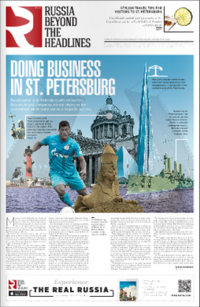Russia Beyond: Difference between revisions
RezviMasood (talk | contribs) m Grammatical correction "a" in place of "an" |
→Structure: Removing self-proclaimed statements. No citation provided for more than 2 years. |
||
| Line 54: | Line 54: | ||
== Structure == |
== Structure == |
||
''Russia Beyond'' is managed by a section of the state-operated domestic Russian-language news agency [[TV-Novosti]], a daughter company of the [[Rossiya Segodnya]]. |
''Russia Beyond'' is managed by a section of the state-operated domestic Russian-language news agency [[TV-Novosti]], a daughter company of the [[Rossiya Segodnya]]. |
||
The ''Russia Beyond'' editorial team consists of the Central Desk, which produces material shared across countries and regions, and of regional clusters, where this material is adapted to specific countries, adding themes relevant for a particular region. In addition, each regional division of ''Russia Beyond'' publishes material on bilateral relations with Russia.{{Citation needed|date=May 2018}} |
|||
== Criticism == |
== Criticism == |
||
Revision as of 17:14, 21 August 2019
This article needs additional citations for verification. (December 2015) |
 | |
 Russia Beyond The Headlines insert in 20 November 2015 international edition of The New York Times | |
| Type | social media, website |
|---|---|
| Owner(s) | Rossiya Segodnya |
| Editor-in-chief | Margarita Simonyan[1][2] |
| Founded | 2007 |
| Language | English, Spanish, Portuguese, French, German, Indonesian, Japanese, Italian, Bulgarian, Macedonian, Serbian, Croatian, Slovenian |
| Headquarters | 24 bld.4 Pravdy Street Moscow, Russia |
| Website | rbth |
Russia Beyond is a multilingual publication owned by the Rossiya Segodnya, a Russian government state news agency, offering news, comment, opinion and analysis on culture, politics, business, science and public life in Russia. The newspaper has been criticised for being a Russian propaganda outlet.[3][4][5][1]
History
| 2007 | RBTH launched by the Rossiyskaya Gazeta |
|---|---|
| January 9, 2016 | RBTH became part of TV-Novosti |
| 2017 | Dropped all printed versions |
| September 5, 2017 | Renamed to Russia Beyond |
2007
- Russia Beyond The Headlines was launched in 2007 by the Rossiyskaya Gazeta, the Russian state newspaper of record. The first publisher of the project was the deputy CEO of Rossiyskaya Gazeta Eugene Abov.[6]
2016
- On January 9, 2016, RBTH became part of TV-Novosti whilst retaining its own distinct brand.
2017
- In 2017 the project dropped all printed versions,[7] although it was still offered as a print supplement to New York Times in 2018.[1]
- On 5 September 2017, RBTH dropped the last two words of its full name, becoming Russia Beyond.
Structure
Russia Beyond is managed by a section of the state-operated domestic Russian-language news agency TV-Novosti, a daughter company of the Rossiya Segodnya.
Criticism
Russia Beyond has been criticised for being a para-governmental Russian propaganda organisation.[8][5][1]
A number of Western prestigious names in newspaper publishing have been criticised for helping to uncritically promote Russian misinformation. In Europe, the Russian-state media entity paid London's Daily Telegraph, Le Figaro in France, Süddeutsche Zeitung in Germany and the Italian daily La Repubblica to be distributed as an insert to those publications, and in the United States it partnered with The Washington Post until 2015; The Wall Street Journal and The New York Times were bundling the insert into their regular editions as of 2018.[9][4][3][1]
In the case of The Daily Telegraph, the Kremlin-backed Beyond the Headlines paid the British publisher £40,000 each month to be distributed as a supplement to its weekend publication, whilst the Telegraph website also featured content from RBTH's website. The monthly Russia-themed supplement first appeared in the British paper The Daily Telegraph and the American Washington Post in 2007 under the name Russia Now.[1][10][9][4]
See also
References
- ^ a b c d e f Foxall, Andrew (9 March 2018). "U.S. Media Long Carried Putin's Water - Odd, Given Facebook Uproar". RealClearInvestigations. Archived from the original on 6 April 2019. Retrieved 6 April 2019.
{{cite news}}: Unknown parameter|deadurl=ignored (|url-status=suggested) (help) - ^ "About us / Russia Beyond". Retrieved 6 April 2019.
- ^ a b Shafer, Jack (30 August 2007). "Hail to the Return of Motherland-Protecting Propaganda!". Slate. The Slate Group. Archived from the original on 6 April 2019. Retrieved 6 April 2019.
{{cite news}}: Unknown parameter|deadurl=ignored (|url-status=suggested) (help) - ^ a b c K. Lavers, Michael (16 October 2016). "Washington Post publishes pro-Russia supplement". Washington Blade. Lynne Brown. Archived from the original on 28 June 2016. Retrieved 6 April 2019.
{{cite news}}: Unknown parameter|deadurl=ignored (|url-status=suggested) (help) - ^ a b Foxall, Andrew (1 March 2015). "The war at home: how Russia is winning the battle for hearts and minds". New Statesman. Archived from the original on 2 March 2018. Retrieved 6 April 2019.
{{cite news}}: Unknown parameter|deadurl=ignored (|url-status=suggested) (help) - ^ "Абов Евгений Владимирович "Биография"". 25 March 2019. Retrieved 25 March 2019.
- ^ "Russia Beyond The Headlines was handed over by the managing RT TV channel of the company". 9 January 2017. Retrieved 10 May 2018.
- ^ Greenslade, Roy (29 July 2014). "Telegraph to continue publishing Russian propaganda supplement". The Guardian. ISSN 0261-3077. Retrieved 13 April 2017.
- ^ a b Muir, Hugh (2 September 2008). "Diary". The Guardian. Guardian Media Group. Archived from the original on 18 June 2017. Retrieved 6 April 2019.
{{cite news}}: Unknown parameter|deadurl=ignored (|url-status=suggested) (help) - ^ Shepherd, Robin (30 April 2013). "Britain's Telegraph runs pro-Putin advertorial". The Commentator. Archived from the original on 29 January 2018. Retrieved 6 April 2019.
{{cite news}}: Unknown parameter|deadurl=ignored (|url-status=suggested) (help)
